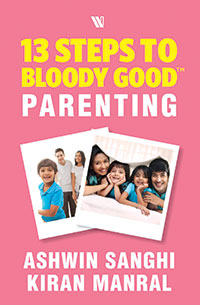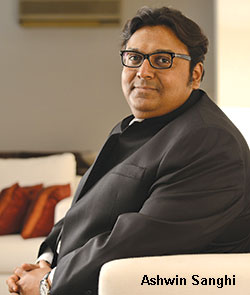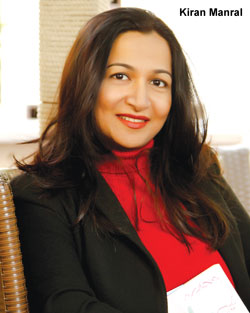ParentsWorld presents an excerpt from the recently published 13 Steps to Bloody Good Parenting authored by best-selling novelists Ashwin Sanghi (Private India) and Kiran Manral (Once upon a Crush)

Step one: Celebrate
There’s a fairy story I remember from my childhood. It was a story of a princess. Her father, the king, celebrated her sixteenth birthday with great pomp and splendour, inviting the entire kingdom and all the neighbouring kingdoms to the festivities. Psst, in retrospect, it was probably the king’s way of putting the flag out that the princess was now eligible for marriage but at that point I had no clue of this phenomenon of announcing a girl’s coming of marriageable age.
To my then innocent mind, the fact that there was absolutely no mention about the celebrating of her previous birthdays had outraged me and I was up in arms on behalf of the princess. ‘Was this her first birthday party?’ I asked my father, who was reading out the story to me. ‘Didn’t they celebrate any other birthday for her?’
My father, God bless his soul, did his best to reassure me that of course, they had celebrated all previous birthdays, but perhaps this one was a big one because she had come of age. I, in the true manner of all mistrusting little kids, furrowed my brow furiously. I ended up feeling rather sorry for the poor princess who, in my head, had never had a birthday party ever until she was sixteen. At that moment, I was one up on a princess, because I’d had a birthday party for all my eight years.
As I grew, I realised that the parties were not the only way my parents celebrated me. And it is only now, that I am a parent myself that I realise how I need to learn from what they did. I realised we think so far into the future that we constantly tend to forget the here and now, and that is the place children live in: the present. Every moment we have with them is a celebration of sorts. As Antoine de SaintExupéry said in The Little Prince, ‘All grown-ups were once children… but only few of them remember it.’
 The offspring came eight years after our marriage. We had sown all our wild oats, and were so ready to be responsible, calm, mature parents. But the first time I held my son, a bomb of panic exploded in my chest. I was now responsible for this delicate life. Honestly, I felt kind of shortchanged. This little creature looked nothing remotely cute and babylike at that moment, freshly out of the womb. Squished up face, red like a tomato, still slimy from the blood post C-Sec. Where was the myth of the fresh smelling, gurgling, baby powder smelling bundle of cuteness the television ads had sold me? He opened his eyes, stared at me for one long second. I was the first thing he saw in his life, I realised. I hoped it enhanced his fledgling view of the world he’d emerged in, but I would never know, of course. I realised the truth of what Roald Dahl said in Matilda right then, ‘It’s a funny thing about mothers and fathers. Even when their own child is the most disgusting little blister you could ever imagine, they still think that he or she is wonderful.’ I fell completely in love with him. The spouse, sadly, was relegated firmly to second spot at that moment.
The offspring came eight years after our marriage. We had sown all our wild oats, and were so ready to be responsible, calm, mature parents. But the first time I held my son, a bomb of panic exploded in my chest. I was now responsible for this delicate life. Honestly, I felt kind of shortchanged. This little creature looked nothing remotely cute and babylike at that moment, freshly out of the womb. Squished up face, red like a tomato, still slimy from the blood post C-Sec. Where was the myth of the fresh smelling, gurgling, baby powder smelling bundle of cuteness the television ads had sold me? He opened his eyes, stared at me for one long second. I was the first thing he saw in his life, I realised. I hoped it enhanced his fledgling view of the world he’d emerged in, but I would never know, of course. I realised the truth of what Roald Dahl said in Matilda right then, ‘It’s a funny thing about mothers and fathers. Even when their own child is the most disgusting little blister you could ever imagine, they still think that he or she is wonderful.’ I fell completely in love with him. The spouse, sadly, was relegated firmly to second spot at that moment.
Everything was a celebration in that first year of his babyhood: the first time he managed to flip himself onto his stomach, his first word, first tooth, first step, his first trip out of town, and never mind the nervous breakdown I almost had in the process. Slowly, the firsts began to be celebrated a little less. Like all relationships, I began to take my little miracle for granted. And so my world went on. Celebrations had been reduced to the annual event of the grand birthday party, with the balloons, the huge cake, the music and the return gifts, not to mention the ensuing two days one needed to recover from the exhaustion of organising it all. The miracle of my child kept unfolding in front of me every single day but I was taking note of it only once a year.
The other day, I realised he was no longer a child; he is now a teenager, and in a few years he would be grown up. And apart from the birthdays, there was little celebration we had done of the everyday. There was always something to get out of the way — potty training, school admissions, term examinations, final examinations, the list never ended. Celebrating one’s child in the everyday sadly got relegated to the list of good intentions.
 Why does a child need celebrating?
Why does a child need celebrating?
We don’t realise it but children like to feel special, wanted and cherished. There’s a fine balance to this of course. Too much of this and you could attach a basket to the ensuing helium head the child will develop and float skywards. Too little and the child might feel he or she isn’t valued enough by their parents, and then grow up needing therapy to resolve abandonment issues.
How does one celebrate a child each day?
Is celebration the throwing of grand parties with games host, DJ, cake and hapless folks shovelled into cartoon character costumes? Not really, though those are good once a year. In the everyday, celebrating a child is anything from a dessert they’re fond of to a day spent picnicking as a family.
Celebrating a child everyday might seem rather difficult on days when she’s throwing the grandparent of all tantrums and making you seriously consider putting them up for adoption with the papers signed in triplicate (I kid, of course), but simply celebrating the moment and making it special could help create a bedrock of self-esteem to carry the child through the hormonal rollercoaster of adolescence and early adulthood. To pay heed to the ever so wise Erma Bombeck, ‘Children make your life important.’ How would they know how important they are to us unless we show them that they are?
I was at a leisurely luncheon the other day, with a group of friends, some of whom were mothers. I asked them how they celebrated their children. For a moment there was silence. The sangrias were downed a tad quicker while they pondered. Then answers began flowing in, and they weren’t exactly what I thought they would be, but they were all food for thought.
I bake a cake every time she scores well in her class test.
We make sure we have one meal a day together as a family.
We get all her interesting art work framed and hung on a wall at the entrance of our home.
When he does a task on his own, he gets to choose what we all eat for dessert that night at dinner.
My daughter recently began dressing herself up on her own, and in celebration we took her out to a theme park for a day.
We have a wall of fame in the family, which is actually just a soft board decorated with tinsel and fairy lights, where every achievement no matter how little, gets posted.
When all the responses had come in, and been tabulated in my mind, what remained was the realisation that they were all so different, but unified with the underlying premise that the celebrations didn’t involve material things at all, but instead involved time, love and attention. These little gestures, I realised, were in the words of Swindell, ‘… deposits in the memory banks of our children.’
Here’s how you could celebrate every day with your kids. And yes, there’s always room for cake in any celebration, birthday or not. After all as Julia Child said, and any kid worth his sugar high would agree, ‘A party without a cake is just a meeting.’
Don’t miss the small moments
While a birthday is definitely a reason to celebrate, but so is a first fallen tooth. Going up a belt level in karate deserves a gift for sure, but learning to tie one’s shoelaces and moving up from Velcro is also celebration worthy. It might deserve a hug, a kiss and a warm, heartfelt declaration of how proud you are she’s learnt it. And perhaps an ice cream sundae or an unscheduled trip to the play zone. ‘To be in your children’s memories tomorrow, you have to be in their lives today,’ observed literary critic Barbara Johnson.
Eat dinner together
Every meal eaten together as a family is a mini-celebration of sorts, in this, an age where everyone is rushed off their feet and hard-pressed for time enough to sit down and eat together. Why is eating one meal together a celebration? It just affirms that family is important, and spending time with your kids is important to you as parents. Interestingly, eating dinner as a family has other benefits as well that you might not realise.
A 2010 study conducted by Elgar, Wendy Craig and Stephen Trites from Queen’s University Canada reported that frequent family dinners together related to children having fewer emotional and behavioural problems. Family dinners, said the researchers, were chances for interactions between parents and children. This in turn had an impact on decisions involving nutrition, sharing of concerns and made the child feel cherished and loved. An additional benefit? Eating a meal regularly as a family gets the kids more eager to try out new foods and experiment with flavours if everyone is eating it.
(Excerpted with permission from 13 Steps to Bloody Good Parenting by Ashwin Sanghi and Kiran Manral, Published by Westland)
Recommended: Managing the parenting stress crisis
























